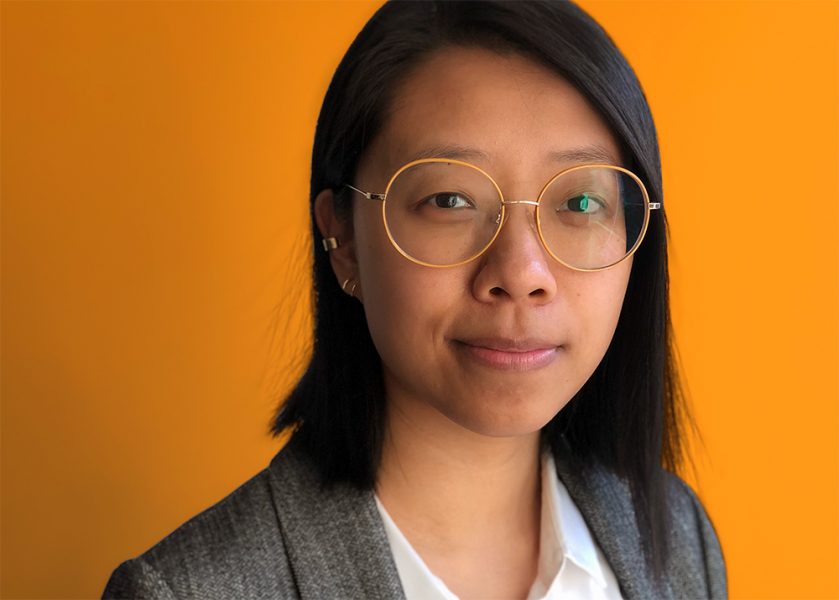Sisi Wei is the Co-Executive Director at OpenNews, where she envisions and executes transformative initiatives for journalism, especially for journalists of color and local journalists. As part of her work, Sisi founded the DEI Coalition For Anti-Racist, Equitable, And Just Newsrooms in 2020, and led more than 100 members of the journalism community in co-creating and launching the DEI Coalition Slack space in March 2021. In 2021, Sisi won the Gwen Ifill Award, which honors a remarkable woman journalist of color whose work embodies Ifill’s legacy of supporting and elevating women of color in news media. Previously, she was the Assistant Managing Editor at ProPublica, during which she edited and managed news apps, graphics, visual investigations, and large, interdisciplinary projects. She serves on the board of News Revenue Hub and is the co-founder of Code with me.
What drew you to the field of journalism and how did you get your start?
I was drawn into journalism early, but I was convinced I would hate it! In high school, my first English teacher recommended that I try signing up for a journalism class the next semester. But interviewing strangers sounded terrifying! I told her this, and to my great benefit, she responded that well, if I found out I hated it, I could just stop taking journalism classes. High school me thought to herself, yeah okay, that makes sense.
In that first class, I made terrible, rookie mistakes that still make me laugh. For example, for one story, I only interviewed my best friends, especially the ones who were in the journalism class with me! Afterward, our teacher told the whole class that only using your friends as sources wasn’t good journalism and we needed to replace any quotes from our friends. Maybe he told the whole class that because other kids did it too, but it was probably because my case was so egregious.
I ended up really enjoying writing and reporting though, and after that first class, I was hooked. There was so much about journalism I wanted to learn beyond reporting, including page design and editing too, so I went on to take those classes, and practically spent all my free time in the high school newspaper classroom.
You’ve been in your role as co-executive director at OpenNews since April 2021. Can you tell us a little bit more about the work involved in your position?
Being a co-executive director means sharing leadership, and I want to quote a really beautiful passage from what Jean Friedman-Rudovsky and Cassie Haynes at Resolve Philly wrote recently about what that means:
“Sharing leadership means sharing the burden, the responsibility, the joy, and the sometimes unyielding demands of building something great. Choosing to be co-executive directors (and of course going to therapy regularly) is likely the most important preventative measure we could have taken to ensure that the two of us are able and excited to do this work for the long haul.”
Erika Owens, who has been the executive director of OpenNews since 2018, first asked me if I might be interested in becoming co-EDs in late 2020. By the time we made the decision and then announced it in April, we had already started working together on a regular basis, shaping what it would literally mean to share leadership between us. We talked about things as detailed as, are we going to alternate responding to email threads (a technique we learned from Cassie and Jean!), and we talked about big picture questions like, are we going to have a clean split of responsibilities. Our literal work isn’t intrinsically different from the work of other people who work as executive directors of small nonprofits — we do everything from running programs to hosting events to fundraising, but because we are sharing decision-making power and sharing responsibilities, we communicate very openly with each other, and get to lean on each other for support. Shared leadership has been such a powerful experience that I don’t think I can go back to singular leadership again!
What would it have been like to have the Ida B. Wells Society early in your career?
Even as a high school student, I knew I wanted to be an investigative journalist, but I was too scared to admit it, even to myself. It wasn’t imposter syndrome exactly, instead, it felt like what I wanted was simply inaccessible to me. I sure didn’t know anyone who was an investigative journalist. My parents didn’t either. Our school never had any investigative journalists come to speak. I also never saw any investigative journalists on the evening news who looked like me.
When I got to college, we had one single investigative class for undergraduates, led by a white professor. Getting into the class was an exclusive, application-only affair, and only if you were an upperclassman. You were also required to commit to a less-than-full class load, and minimal extracurriculars, to make time for the class. When I was finally eligible, I was incredibly excited to apply, and because the deadline was during another journalism class I had, I turned in my application early. Once I got out of class, I saw that the professor had emailed me with a couple of follow-up questions. I don’t remember what they were anymore, but I do remember taking some serious time to think through my answers before I wrote back to him the next day. He wrote back that because I responded a day past the deadline, the class was now full and I would not be in it. I remember how crushed I felt reading that email. Should I have skipped class to respond right away? Was I being penalized for not doing so?
After clearing my head, I was able to re-read the message and realize that the professor offered to reserve a spot for me next semester, as long as I applied again. But I really hesitated. Part of me looked forward to pursuing my dream next semester. Part of me felt like if I did, I’d be setting myself up to be penalized for more things that didn’t make sense to me. In the end, it never ended up working out, because I applied and was awarded grant funding for my own features reporting project that next semester. I knew I wouldn’t be allowed to do both.
My colleagues at ProPublica know how much being an investigative journalist has and continues to mean to me, and looking back on this experience, the amount of gatekeeping and inequity involved in it angers me, but the sad truth is that the same amount of gatekeeping and inequity exists in the journalism industry today. Why was there only one opportunity for students to learn investigative journalism from a professor, at a journalism school? Why did it privilege students who could drop everything else in their lives, such as part-time jobs, other coursework, and other journalism opportunities?
If the Ida B. Wells Society had existed back then, it would’ve given me another path forward. It would’ve given me the ability to see and access investigative journalists who looked like me, a community to come to so I could ask for help when others excluded me, and a place to learn how to do investigative journalism, when my own school put up so many barriers to teaching me.
We know you are doing a lot of work with the DEI Coalition at OpenNews. Can you tell us more about that and what the coalition has been up to?
Yes! Together with many DEI Coalition members, we just launched our first public resource on Jan. 5, 2022, based on a conversation that happened within our Slack on what white managers can do to build trust and support their colleagues of color. This launch is really exciting because by working on this resource, we now have a drafted process for how to turn private, off-the-record conversations into a public resource — while centering consent and transparency in the process. Another Coalition member is currently leading a second iteration of this, and it’s already going to be a different type of resource, but it values consent and transparency just as much. I hope this opens the door for members to create more public resources in the future, and can also help other Slack communities set up ways to do the same. In the coming months, I’ll also be sharing a guide on our process and how others can replicate it. In the meantime, folks can also check out the resources the Coalition has published here.
Do you have any advice for our members on how to spot opportunities to move into leadership roles?
Go with what you’re passionate about, and turn that into a leadership opportunity.
Early on in my journalism career, I felt like all the diversity-related networking events at conferences were centered around happy hour mixers (luckily, this is no longer the case these days). Not only do I not drink, but I’m also an introvert. I thought to myself: there has to be a networking event out there that doesn’t center alcohol and actually supports deep, 1-on-1 conversations. When I couldn’t find any, I pitched one myself. I came up with an event centered around a hot breakfast, and a process that matched journalists of color with mentors based on what they said they most wanted help with. I talked to the managing editor of my newsroom to see if we could sponsor such an event at a conference and we created a budget together and a plan for how to come up with the money. I recruited a teammate to organize it with me, recruited an emcee, and a year or two later, we passed the organizing torch to other staff members who cared about the program and could lead it in their own way.
I like to share this example because I was moved to create something because I couldn’t find anything that served people like me. That made the process personally fulfilling, and along the way, I gained experience pitching to senior leaders (successfully!), figuring out a budget, project managing, recruiting mentors who are great leaders in the field, both from my own newsroom and across many others (great networking!), and I also got to create an opportunity for other colleagues to gain similar experiences.
What do you want to see in the future of newsrooms as they work towards creating a more equitable and accessible environment for all journalists?
There are too many things I want, so I’ll just pick one: I want to see newsrooms where all journalists, especially journalists of color, enjoy the same levels of respect, support, and opportunity.

